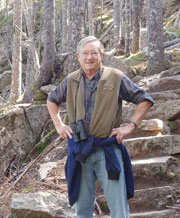
Amos Eno is the president of the Land Conservation Assistance Network. This blog will help you understand why we do what we do and inform you of the current happenings in our focus area.

Read more about Amos S. Eno.
Amos S. Eno has worked in conservation on international, national and state levels. He began his career early in the 70’s working for Nat Reed in the Office of the Secretary of Interior. Subsequently he worked in the Office of Endangered Species, USFWS, and as head of National Audubon Society’s wildlife office in Washington, DC. He developed the programs of the National Fish and Wildlife Foundation from inception and served as Executive Director for 11 years. While with the New England Forestry Foundation he led the team completing the 2 largest forestry conservation easements in the U.S. totaling 1.1 million acres. He has travelled around the world, and spent three years in Africa which provided seminal instruction on the importance of private lands as the key to 21st century conservation strategies.
 Sign In
Sign In
 Sign In
Sign In
